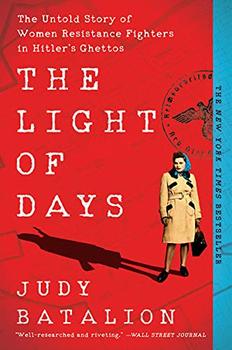Summary | Excerpt | Reviews | Beyond the Book | Read-Alikes | Genres & Themes | Author Bio

The Untold Story of Women Resistance Fighters in Hitler's Ghettos
by Judy BatalionThis article relates to The Light of Days
 "To fight or flee?" This is a question the Polish resistance fighters must ask themselves in Judy Batalion's The Light of Days. As the German army advanced across Europe and persecution of the Jews intensified, those who chose to flee had to decide where to go. As their own countries were invaded, some European Jews emigrated to neighboring countries only to find themselves in the clutches of the Nazis yet again. Individuals, families and entire communities were buffeted between towns and cities all over Europe. Others attempted to emigrate to the U.S. only to be turned away on the suspicion that they were actually Nazi spies. Some Jews dreamt of making "Aliyah" and escaping to Palestine. The journey was difficult, however, not only because of German restrictions on Jewish travel but also because of policies known as the British White Papers.
"To fight or flee?" This is a question the Polish resistance fighters must ask themselves in Judy Batalion's The Light of Days. As the German army advanced across Europe and persecution of the Jews intensified, those who chose to flee had to decide where to go. As their own countries were invaded, some European Jews emigrated to neighboring countries only to find themselves in the clutches of the Nazis yet again. Individuals, families and entire communities were buffeted between towns and cities all over Europe. Others attempted to emigrate to the U.S. only to be turned away on the suspicion that they were actually Nazi spies. Some Jews dreamt of making "Aliyah" and escaping to Palestine. The journey was difficult, however, not only because of German restrictions on Jewish travel but also because of policies known as the British White Papers.
After World War I, the League of Nations (LON) was established to foster and maintain global peace. One of its initiatives was the Mandate System, which placed many of the territories of the former Ottoman Empire into "temporary trust … to see to the well-being and advancement of its population." One of these areas was the disputed territory of Palestine. Britain was granted a mandate to oversee Palestine in 1920, three years after it had released the Balfour Declaration, a public statement of support for a Jewish homeland there. Both Palestinian and Jewish populations already lived in the contested space, but the Jews made up a significant minority. In 1921 there was a series of violent clashes between Jewish and Palestinian groups. In partial response to this violence, the LON recognized the ancestral connection of the Jewish people to Palestine, and in 1922 Britain was entrusted with the creation of a Jewish state. The 1922 Mandate for Palestine is considered the first of three official British policies issued on Palestine, which came to be known as the White Papers.
Next came the 1930 Passfield White Paper, which proclaimed that while the British Mandate obligated Britain to mediate disputes between the Palestinians and Jews it did not necessarily include a mandate for the creation of a Jewish homeland. This was followed by the 1939 White Paper, which emerged out of a series of conferences to discuss the borders of a proposed Jewish State. No agreement could be reached and the British government decided to delay the establishment of the Jewish State for an additional 10 years, and to permit no more than 75,000 Jews to emigrate over the next five years, followed by 10,000 per year in the five years after that.
This decision was made under pressure from the Palestinian government and presumably in an attempt to bring about a peaceful resolution to the unrest in the region, but its consequences were disastrous. Rather than enabling what might have been a robust and organized repatriation of Jews to Palestine, the British government severely restricted Jewish immigration to the would-be nation-state. Those Jews who had managed to emigrate were often prohibited from buying land — the dream of establishing a kibbutzim (community) many nurtured during World War II dashed. The effect on Jews in Nazi-controlled Europe was devastating. Many who might have escaped the concentration camps through legal immigration went to their deaths instead. Concurrently, an "illegal" system of immigration, known as Aliyah Bet, proliferated. It's estimated that 100,000 Jews had circumvented British authority to enter Palestine in this manner by 1948.
In 1947, Britain terminated the Mandate and relinquished the trust, allowing for the creation of the Jewish state of Israel, established May 14, 1948.
Polish Jewish refugee children arriving in London, 1939 courtesy of the German Federal Archives
Filed under People, Eras & Events
![]() This "beyond the book article" relates to The Light of Days. It originally ran in April 2021 and has been updated for the
August 2022 paperback edition.
Go to magazine.
This "beyond the book article" relates to The Light of Days. It originally ran in April 2021 and has been updated for the
August 2022 paperback edition.
Go to magazine.




Beware the man of one book
Click Here to find out who said this, as well as discovering other famous literary quotes!
Your guide toexceptional books
BookBrowse seeks out and recommends the best in contemporary fiction and nonfiction—books that not only engage and entertain but also deepen our understanding of ourselves and the world around us.